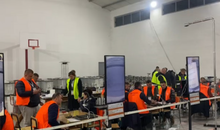
 Flash News
Flash News
Counting ends in Kukës district, DP wins 2 mandates
Egnatia is declared champion of Albania, ending Vllaznia's 24-year dream
DP leads in Kavaja against SP
Financial Times / Rama wins fourth term: the creation of a cosmetic pluralism is at risk
Neither PS, nor DP/ In Vau i Dejës, Tom Doshi's party is declared the leading force

Alfred Lela
The Prime Minister of Albania has a relationship with Kosovo and its leaders, which can be seen, at least, as capricious. What seems like a mild description of the strong ups and downs relationship with the leaders of the second Albanian state in the Balkan Peninsula, in fact, gives the essence of Rama's program (or lack thereof) regarding Kosovo.
To put it bluntly, it does not operate with a national register, but with an international agenda. The latter does not seem like a project that serves the displacement forward and the fruitful position of the Albanian cause in the world but as a self-promotion platform of the Prime Minister of Albania. You can find, among other things, the prominence of this self-pity, both in the parody statement of the Serbian President: 'these things Edi knows, he is a global leader', as well as in the pollock's brush of Minister Milva Ekonomi, who had distinguished the Prime Minister as the only international brand of Albania.
While Edi the international brand is not a problem at all, it even helps the image of the country, the public communication of today is especially the image and its accompaniment, it turns into impatience and an obstacle when it becomes a goal in itself.
If you put to the test of memory the lecture of Mr. Rama, you will remember at least two moments when he calls for a 'global consciousness', implying a role for himself, greater than the scope and geopolitical impact of the country he represents allows. As a preferred example to illustrate why Albanians and Serbs should become brothers, the Franco-German pact was brought, which was built on the ruins of two world wars. Mentioning and implying the founding fathers of Europe, Konrad Adenauer, and Robert Schuman, he put himself in the role of Balkan conciliator, along with Aleksandar Vucic. What will be emphasized in this case, and has logical and historical significance, is that in this duo only Vuçiç has something to offer, and if he does, he should look not to Albania, but to Kosovo.
This is the Kosovar anger with Edi Rama, and this he pretends to understand, or pretends. This protagonism of peace with the expenses of the blood bank and the memory of the other, makes the Prime Minister seem insensitive and a political adventurer, at least in Kosovo. At the core of this misunderstanding of historical truths and sensibilities, lies the Kosovar side with it. Apart from Hashim Thaçi, unfortunately in The Hague, the Prime Minister of Albania does not find any political door to knock on in Prishtina, and this is not for the whims of Kosovar political exponents.
Rama is fascinated with the open society, the global village, his role in it, and the holy ghost of Soros above all, as he looks like one of the chiefs of 6 European countries that still do not recognize Kosovo. Without reaching an Albanian-Albanian pact, there can be no Albanian-Serbian peace. Whoever feeds this illusion knows neither history nor law, but only personal interest and the 'black magic' that heals the world from the conflict with empty phrases of the international left.
Finally, Rama brought another parallel to evoke the Serbo-Albanian peace, the bloody Japanese-American L2B conflict. Nothing more can be said about this analogy than the simple fact that two emperors enter and leave the war in the hours of mutual horror, but the aggressor and the victim, as in the case of the Serbo-Kosovo, are subject to a different calendar.
In the end, if Rama is going to open the Balkans, he wants the historical role of reconciliation of the peninsula, etc., he must start it from the Albanians. Both in Prishtina and in Tirana.
Latest news


Vote counting in Mirdita concludes, DP wins convincingly
2025-05-12 23:40:46
Diaspora vote counting/ Observer - Ballës: Get out, you kicked us out of Albania
2025-05-12 23:27:36
Four almonds a day, 6 direct benefits to the body
2025-05-12 23:15:40
Vllaznia team 'doctor' arrested, dozens of fireworks found in his bag
2025-05-12 23:02:26
Denunciation/Electoral Reward for Noizy
2025-05-12 22:51:44
She won the mandate from the open list in Kukës, here is who Elvira Peka is
2025-05-12 22:38:39
Victory in Kukës, Flamur Hoxhaj: Fruit of the work and program we have done
2025-05-12 22:30:07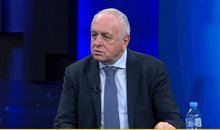
Tritan Shehu talks about the election result: Lazarati voted for the DP
2025-05-12 22:30:03
Trump may travel to Turkey for negotiations between Zelensky and Putin
2025-05-12 22:16:46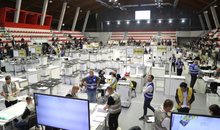
Counting ends in Kukës district, DP wins 2 mandates
2025-05-12 22:11:27
Egnatia is declared champion of Albania, ending Vllaznia's 24-year dream
2025-05-12 22:03:56


Albanian convict terrorizes prison in Greece, takes guards hostage
2025-05-12 21:36:15
Rama leaves headquarters, does not speak to journalists
2025-05-12 21:26:16
New report, old refrain
2025-05-12 21:18:59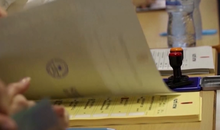
DP gains advantage in Lezha, secures 4 mandates
2025-05-12 21:06:16
DP leads in Kavaja against SP
2025-05-12 20:57:52
In Shkodra, Vllaznia brings together the commissioners of the SP and the DP
2025-05-12 20:43:15
60% of votes counted across Albania, how mandates are distributed
2025-05-12 20:30:56

OSCE-ODIHR Report/ Media in Albania, collaborators of the government
2025-05-12 20:20:13
What would happen to your body if you slept less than six hours?
2025-05-12 20:08:27
Counting closes in Librazhd, how votes were divided between the DP and the SP
2025-05-12 20:02:24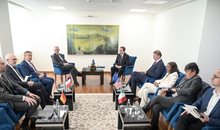
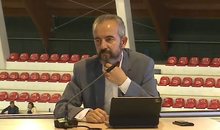
Celibashi: Here's when we can have the final election results
2025-05-12 19:45:19
The May 11 elections, with old problems
2025-05-12 19:37:31
Source: DP should request the annulment of the elections
2025-05-12 19:25:20
From May 15, President Osmani begins efforts to unblock the Parliament
2025-05-12 19:18:39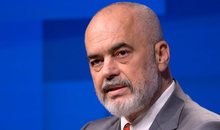

Vllaznia-Egnatia is played today, Shkodra fans arrive at the "National Arena"
2025-05-12 19:03:11
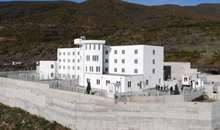
Even in the women's prison, the SP is voted for
2025-05-12 18:44:08
Accident in Laç, 84-year-old man taken to Trauma Hospital
2025-05-12 18:30:36
Counting continues in Tirana, Tabaku: Projection of mandates will change
2025-05-12 18:18:03

The Diaspora vote, a reflection of the elections within the country?
2025-05-12 17:59:12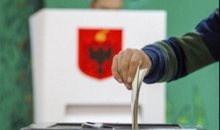


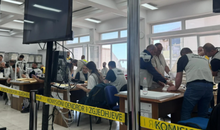
The DP leads confidently in Fushë Krujë and Kamëz
2025-05-12 17:19:50
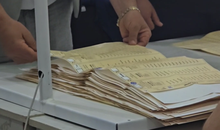


Number of diplomas declining, 9-year education most affected
2025-05-12 16:41:54
Leaving aside votes from Greece, CEC: They will not be excluded from the count
2025-05-12 16:31:53

They photographed ballots, two people are wanted in Tirana
2025-05-12 16:11:52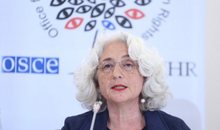
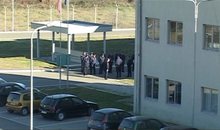
Prisoners choose Rama!? PS wins with 82% in Elbasan detention center
2025-05-12 15:55:19

Austrian tourist, injured in accident on Himara-Borsh road, dies
2025-05-12 15:37:14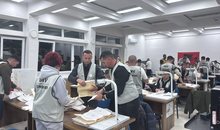
The counting process in Cërrik ends, here's who won
2025-05-12 15:31:20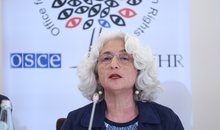

"There are violations!"/ Vote counting halted in CEAZ 17 in Klos
2025-05-12 15:11:41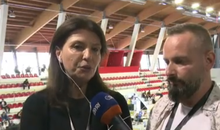


Who are the candidates of small parties who secure a seat in the Assembly?
2025-05-12 14:50:24
The elections were held under political patronage - organizations emphasize
2025-05-12 14:49:37
Berisha warns: The opposition will not turn a blind eye to violations
2025-05-12 14:28:33

Why did Rama grow up?
2025-05-12 14:11:37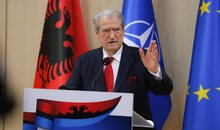
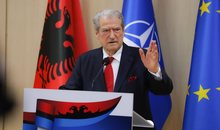

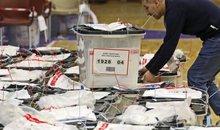
Vote counting in Delvina closes, here are the results
2025-05-12 13:38:57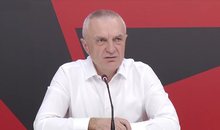
He is running on an open list, how many votes has Ilir Meta received so far?
2025-05-12 13:20:00



Vote counting in Fier suspended, process resumes tomorrow at 08:00
2025-05-12 12:24:35
Electronic voting results published in Vora, votes for each party
2025-05-12 12:10:03
In such elections, victory can only be Edi Rama's.
2025-05-12 12:01:10
Threatened journalist during duty, 26-year-old faces criminal charges
2025-05-12 11:57:39

The counting process in Himara ends, the Socialist Party wins
2025-05-12 11:49:17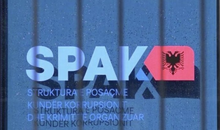
May 11th elections, SPAK: 39 criminal proceedings have been registered
2025-05-12 11:36:25
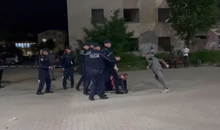

PSD third political force, what are the chances of the 'small ones' so far?
2025-05-12 11:04:31
Counting ends in Rrogozhina, SP emerges as the leading force
2025-05-12 10:50:30
Counting ends in Tepelena, Socialist Party wins
2025-05-12 10:45:23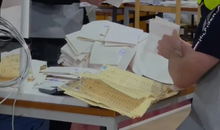
Counting ends in Memaliaj, Libohova and Këlcyrë, here's who's leading
2025-05-12 10:28:23
Mirditë/ DP leads over SP, how many votes have they received so far
2025-05-12 10:23:30
Spain makes decision, shortens weekly working hours
2025-05-12 10:10:30

Threats for a vote, the party's deputy chairman under investigation by SPA
2025-05-12 09:53:18
The DP-ASHM coalition leads in Kavaja
2025-05-12 09:47:41
DP-ASHM leads in Kukës after counting 71 ballot boxes
2025-05-12 09:31:26
BIRN: Organized crime “oriented” the vote in Durrës
2025-05-12 09:24:39

Counting ends in Kolonjë, who is leading?
2025-05-12 09:00:13

Counting ends in Pustec, SP leads
2025-05-12 08:41:21
First diaspora votes counted, DP-ASHM leads by a narrow margin over SP
2025-05-12 08:38:13

DP leads in Kukës, over 3 thousand votes ahead of SP
2025-05-12 08:16:02
First ballot boxes counted, DP-ASHM leads in Kruja
2025-05-12 08:04:38